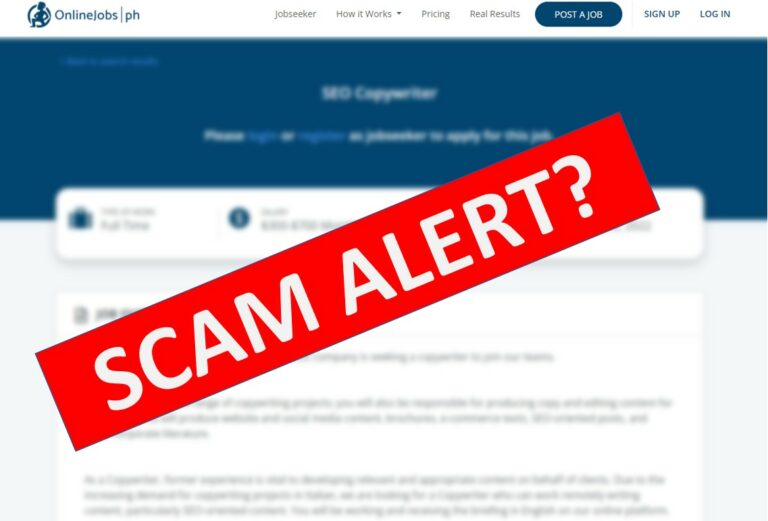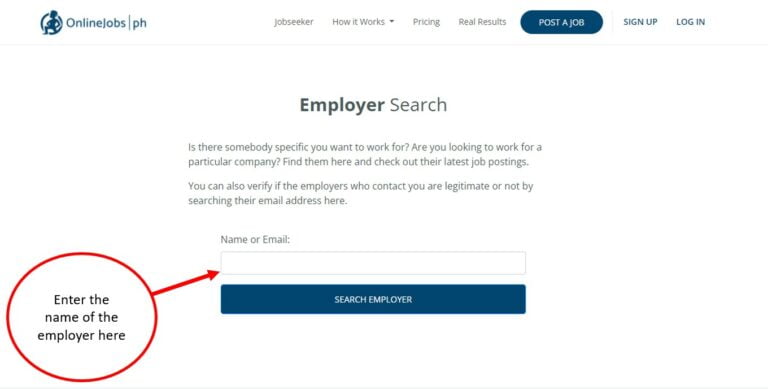
Table of Contents
Is Onlinejobs.ph Legit?
Yes, Onlinejobs.ph is a legit job platform. Thousands of Filipinos find jobs on Onlinejobs.ph every month. A lot of people, both Filipino employees and foreign employers, trust Onlinejobs.ph or OLJ, and have found success to varying degrees. But because it’s popular, you also need to learn to protect yourself from the bad players on the platform.
We can personally vouch that we’ve found legit work on Onlinejobs.ph. But you don’t have to take our word for it, you can join online job communities, such as Online Filipino Freelancers on Facebook and r/buhaydigital on Reddit, and find many people vouching for the platform.
Many employers use it as a platform to seek skilled Filipino workers who are willing to do the job at relatively more affordable rates. Meanwhile, Filipino freelancers use OLJ to start their careers. After they gain enough experience, they eventually increase their rates and start earning big on Onlinejobs.ph and outside the platform.
There are many opportunities on OLJ for an aspiring Remote Filipino Worker. But just like other online job platforms, it is inevitable that there will be some bad players who will be looking to take advantage of vulnerable applicants.
This beginner’s guide will help you weed out the scams from the legit jobs on Onlinejobs.ph.
Video Guide: 5 Common Scams on Onlinejobs.ph
How To Find Onlinejobs.ph Legit Jobs: 5 Step Guide
Step # 1: Verify Info of the Job Poster Using Employer Search
The best way to check if a job post on Onlinejobs.ph is legit is by using OLJ’s Employer Search tool. It’s a simple tool that you can use for any employer verification purposes you need to do on Onlinejobs.ph.
You can use this link to go to the Onlinejobs.ph Employer Search tool: https://www.onlinejobs.ph/jobseekers/employersearch/
When you enter the name or email of a particular employer on the tool, you check if there are any complaints lodged against this employer, as well as, if they have a paid subscription to OLJ.

There’s a higher chance that the employer on Onlinejobs.ph is legit if you get a message like below:
“We have found [EMPLOYER NAME] in our system and it is associated with a fully paid active employer account.
No complaints have been received for this employer (EMPLOYER NAME).
If there are no complaints and the employer has been found in our system with a paid active account, then you should be safe to be hired by this employer. You are also always protected by our jobseeker salary payment policy.”
This means that the employer has a paid subscription, has been verified by Onlinejobs.ph, and has no complaints lodged against them. So, you can apply to them with more confidence.
Step # 2: Carefully Read the Job Description and Watch Out for Red Flags
Is it too good to be true?
There is a popular adage that goes “if it’s too good to be true, then it probably is”. This is a good rule of thumb as a precautionary measure for most things, including online job hunting.
If the job posting offers an extremely good compensation package with very few requirements, it would be best to proceed with caution.
Get as much information on the business as possible. Looking for a business license or any kind of information on them would be best before dealing with them directly. You might be able to find this information on the official website of social media pages.
Here are the possible red flags that a job may be too good to be true:
- No interview requirement.
- You are being asked to pay before you get the job.
- Little to no experience is required compared to other jobs of similar nature.
- Instant employment or rush hiring.
- Abnormally high salary.
- There is no information available about the company on the internet.
Is the Job Offer Too High or Too Low?
On the opposite end of the spectrum, there are some job postings that may offer rather low wages. This can be a good opportunity for you if you’re starting out and want to get the ball rolling, but this could also end up as a dead-end job that may not be worth your time and effort.
Is Your Employer Asking for Your Personal Info/Bank Details and/or an Initial Deposit?
Do not provide your bank account details to your employer, let alone one that you have never dealt with before.
Legitimate employers will often pay you through PayPal or Payoneer, but it’s possible in some occasions that they may ask you for your personal bank account number so that they can transfer the money to you directly.
Just be careful about what details you provide. Only share information that is required to do a transfer. Alternatively, you can create an account on Wise and share the account details from that app instead.
Another thing to be wary of is employers asking for a deposit of some kind. Legitimate employers will not ask you for your money. You are being paid for your service, not the other way around.
If for some legitimate reason they do ask you for some kind of payment, make sure that you get paid first before you shell out money of your own. Never pay more than what you get paid. Regardless, it would be wise to avoid employers such as these.
Is There Too Little Information on the Job and/or the Employer?
An employer’s job description is the rough equivalent of an employee’s cover letter and resume. This is their first filter to hire the best possible candidates to fill in the role that they need.
A legitimate business will put in the effort to create an accurate and detailed job description. It would be in their best interests to provide aspiring applicants with the necessary information needed about the job.
If a company or employer provides little to no information about the work and about themselves, tread with caution. These are telltale signs of a scam.
Step # 3: Search for the Officially Published Information on Your Employer Through Google
Company Official Website
It’s always a good idea to find more information on your potential employer by using Google. Many big and legitimate companies will have some kind of digital footprint. The most official and reliable source would be in the form of an official website.
This should be the best place to look for more information on the company, including its core values, company history, products, services, and contact details. All of this information is valuable to you to better assess the legitimacy of a business.
Company Official Social Media Pages
Aside from the official website, you can also look for their official social media pages. Most serious and legitimate businesses will likely have one. Social media has become a very important tool for businesses to get direct feedback from customers as well as a way to market themselves to new clients.
The most common social media pages to look out for are: Facebook, Instagram, and Twitter. In some cases, they may also have an official Yelp and YouTube page.
These official websites and social media pages outside of Onlinejobs.ph will not only help you assess your new employer’s legitimacy, but they will also give you an idea of what kind of work and company you will be getting into if you get hired.
This gives you an edge during the interview process, as well as good insights on whether you even want to apply for the job or not.
Step # 4: Ask Your Personal Networks and Use Social Media Support Groups
Aside from formal channels discussed previously, it’s also a great idea to search for information on your potential employer using your own personal networks or social media sites and groups that specifically discuss the concerns of employees & freelancers. You can find a number of these kinds of groups on Facebook groups and Reddit to name a few.
The easiest way to search for a company or employer using this method would be to type in the employer’s name in google and add “Reddit” / “Facebook” / “reviews” as part of your search query.
If the prospective employer is well-known or has employed a number of people previously, other employees would have likely talked about that employer already. Don’t be shy to ask other people to get an idea if working with your prospective employer will be worthwhile.
Lastly, even if an employer doesn’t have any existing threads or groups already talking about them, you can always visit one of the many digital groups on social media that discuss online employment.
Here’s a link to a shortlist of a few social media groups that you can approach, both locally and internationally. You can ask the users there if they have had experience working with your prospective employer.
Step # 5: Job Value Assessment
Lastly, even if a job is legitimate, it does not mean that it will be worth your effort and time to apply for it. There are many other considerations that are put into play that can greatly affect your decision on whether or not the job will be worth your time.
You should set your own objectives and timelines on what you want to get out of the job. Once you’ve achieved your desired objectives such as a monetary goal, added entry into your work portfolio, or a job recommendation, move on.
If there are too many drawbacks to taking on the job, it might be better not to pursue it despite it being a legitimate listing.
Here are a few self-assessment guide questions you can ask yourself before applying for the job.
- Is the salary too low for your skillset and experience?
- Do you have any other better job offers?
- How much do you need this job?
- Can you accomplish the job without compromising your other work or projects if any?
- Will successfully accomplishing this job lead to better job opportunities?
- Will this job improve my current skills?
Can this job pay for the essential work-from-home equipment I need to pursue a long-term online career? This is an expense most beginners forget to consider.
Your work-from-home job is a business. Investing in the right tools lets you do the job properly, comfortably, and repetitively.
And your most important tool, your body itself. Treat it well with an ergonomic work-from-home setup, from your chair to your table.
You don’t have to go broke before you even begin working online. There are cheap, but workable options on online marketplaces like Lazada and Shopee.









